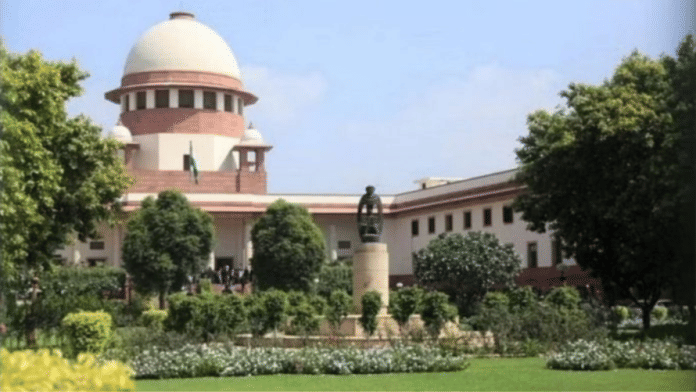New Delhi: The Supreme Court Monday agreed to hear a Tamil Nadu-based trust’s plea seeking a direction to the state government to return all funds transferred arbitrarily and involuntarily to the Hindu Religious and Charitable Endowments Common Good Fund (CGF) from various Hindu temples and endowments.
The CGF was created under the Tamil Nadu Hindu Religious and Charitable Endowments (HR&CE) Act, 1959. According to the petitioner — Aalayam Kaappom Foundation, which is described in the petition as a transparent body that works for the welfare of Hindu temples and Hindu heritage — temples are to make voluntary contributions to the CGF under section 97 of the act. Hindu religious institutions have to transfer funds from the surplus money lying with them.
However, the foundation has claimed — citing official communications between the commissioner, CGF and executive commissioners of various temples — that the contribution by the institutions is no longer of their own volition but has now become mandatory in nature, which is against section 97 of the act.
According to the documents accessed by the foundation, which it has provided to the court as well, the funds are being demanded in a “predetermined manner” and have become a precondition for budget approvals for the temples by the commissioner of the HR&CE Department.
The foundation has further said that the transfer of funds was arbitrary since in many temples, the state government has not appointed trustees, and these institutions remain under the control of HR&CE. Therefore, it argues, the transfer of funds to the CGF under such circumstances is due to coercion by the department.
A bench led by Justice Surya Kant Monday issued notice to the Tamil Nadu government to seek its view in the matter. It also told senior advocate Haripriya Padmanabhan, who appeared for the petitioner, to provide the court inputs on how temples utilise the donations they receive from devotees.
“Do these donations get audited? How are they spent? We must know all this. Because if the donation is being spent on humanitarian activities such as development of schools or hospitals, then it’s fine. But if it is being spent to purchase luxury cars, then it is a problem,” Justice Surya Kant told the counsel, who promised to come back with the information sought by the court.
Also read: SC ‘disappointed’ to learn HC denied Kuki man bail, medical treatment citing Manipur ethnic clashes
State appointees ‘mismanaging’ temples
The foundation has approached the top court by way of an appeal against an order of the Madras High Court in August last year, which dismissed its plea to direct the Tamil Nadu government to return the contributions received by the CGF. The HC rejected the foundation’s request on the ground that the contribution had not been challenged by any temple alleging it was coerced to remit amounts for the fund.
However, the foundation has asserted that funds transferred from January 2011 onwards by Hindu temples and endowments to the CGF were not voluntary contributions and did not adhere to the rules under the HR&CE, 1959 law.
Pointing out that no trustees have been appointed to several temples in the state for years, the foundation says these places of worship were “under the effective control and management of the HR and CE Department and the contributions were being forcibly made to CGF”.
The HR&CE Act allows the government, in certain circumstances, to appoint “fit persons” to carry out the functions of temple trustees. In its petition, the foundation submits that these “fit persons” are “servants of the HR&CE Department and are bound to act only in the interest of the department”.
It adds that these state appointees have “taken over the position of the trustees and have been mismanaging the affairs of thousands of temples in the state of Tamil Nadu”.
This, it claims, is established from the annual budget approvals sent by the commissioner to the respective executive officers of each temple.
The petition argues that all donations to the CGF violate section 97 as well as the rules framed under it. Apart from being voluntary, the transfer of funds to the CGF can only be from surplus funds of the religious institutions, and the utilisation of this money can only be in accordance with the law.
The money accumulated in the CGF can be allocated to a religious institution that applies to the fund commissioner. However, the allotment of funds can only be within the parameters of the 1959 law, the foundation points out in its petition.
It alleges that there is no transparency in the accounting of the CGF, accusing the CGF commission of violating the law by using the money for purposes that are alien to the HR&CE Act.
Raising multiple questions of law before the top court, the foundation has demanded to know whether predetermined amounts for donation by a temple that does not have a trustee can be termed voluntary. It has also questioned the power of the commissioner of the HR&CE department to direct the transfer of money towards CGF, and if remittance of the amount can be made a precondition for the approval of temples’ budgets.
According to the foundation, the remittance of funds to the CGF cannot be predetermined as it must be from surplus funds that accrue at the end of the previous year. This surplus amount of money can only be calculated after making mandatory provisions for the training of archakas (priests), for the health, safety and convenience of disciples, pilgrims and worshippers, and for renovation work connected to the institution.
(Edited by Rohan Manoj)
Also read: Take action against lawyers advertising, seeking work via online portals — BCI to state bar councils






